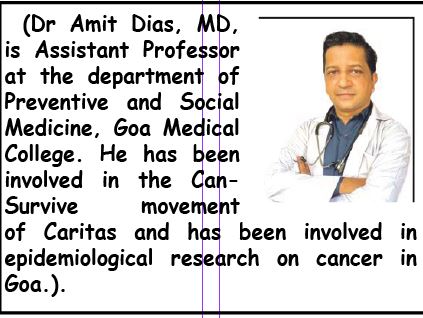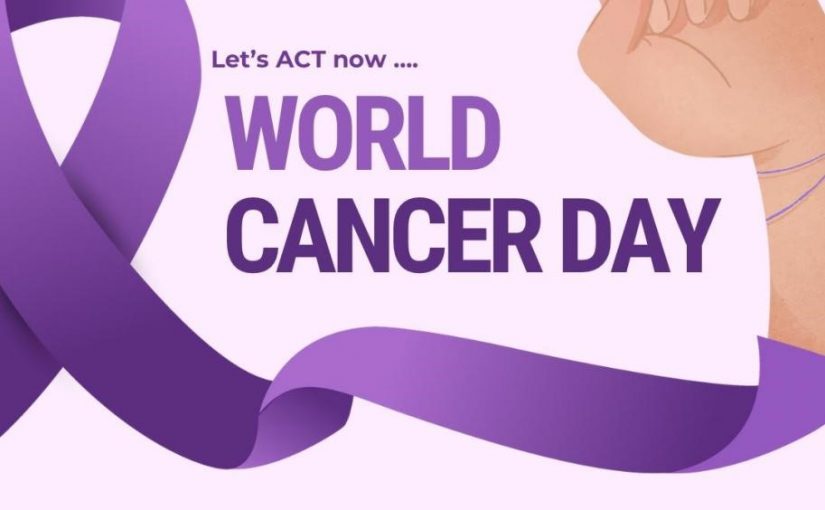An interview with Dr Amit Dias
On World Cancer Day observed the world over on February 4, we asked Dr Amit Dias from the Department of Preventive & Social Medicine a few questions, to prepare our readers for the fight against cancer. “There is a lot that one can do to cancel cancer from our lives, but people fail as they do not recognize the signs early,” he cautions. “The word caution comes loaded with a message that everyone must know!”
Read this interesting and informative interview:
Goan Observer: Thanks for joining us once again on World Cancer Day. What is your key message for cancer remission and care this year?
Dr Amit Dias: My key message as always, would be to caution people against cancer and help them understand the early danger signs of this disease. The message lies in the word CAUTION itself.
C – Changes in bowel or bladder habits
A – A sore that does not heal
U – Unusual bleeding or discharge
T – Thickening or lump in the breast or elsewhere
I – Indigestion or difficulty in swallowing
O – Obvious changes in the size, color, shape, or thickness of a wart, mole, or mouth sore
N – Nagging cough or hoarseness
These signs, if persistent, should prompt individuals to seek medical attention promptly. At the same time, one should not be paranoid about cancer and think that every sign is a diagnosis of cancer — it’s not.
Q: That’s a nice way to remember the warning signs. People often worry about cancer… especially brain tumors after the common melodramatic representation of brain tumors in Bollywood movies. Could you elaborate on the signs of a brain tumor?
A: Again one must realize that there are malignant and benign tumors of the brain. Yes, it’s true that they don’t just come and go like it’s depicted in the movies, nor will shooting a bullet in the brain knock down a tumor. However, it is a serious problem and in India alone, we detect around 40-50,000 cases of brain tumor every year. Many are in children.
A lot can be done to treat brain tumors, but we should not ignore the early signs. I can give you a heads up in that direction…. these are the signs of brain tumour that one should be aware of:
H: Headaches that are new or worsening
E: Eyesight changes, double vision, or loss of vision
A: Altered mental status or personality changes
D: Difficulty with balance or coordination
S: Seizures or convulsions
U: Unexplained nausea or vomiting
P: Persistent weakness or numbness on one side of the body
Q: You mentioned the burden of brain tumors, can you give us an idea as to what the latest statistics on cancer looks like?
A: Cancer is a leading cause of death accounting for around 10 million deaths each year. This effectively means one in six deaths are due to cancer. Breast, lung, colon, rectum and prostate cancers are some of the most common cancers in the world. The good news is that many of the cancers can now be cured if detected early and treated effectively. However, the condition is important and we need to not only screen for early detection but also ensure that once detected, the patient gets access to evidence-based treatment from the experts.
Q: This year’s World Cancer Day theme is “Close the care gap.” Could you elaborate on the theme and its relevance?
A: The theme “Close the care gap” emphasizes the need to address disparities in cancer care, ensuring that everyone, regardless of their background or location, has access to timely and quality care. This includes prevention, early detection, treatment and supportive care. The goal is to reduce the global burden of cancer by making healthcare resources more equitable.
Q: And how does this theme relate to the situation in India? Are there specific gaps in cancer care that need attention?
A: In India, several challenges are contributing to the care gap. Limited awareness about cancer, late-stage diagnoses, inadequate infrastructure, and uneven distribution of healthcare resources are significant factors. Goa has taken a lot of positive steps to strengthen cancer care. Last year an MOU was signed between the Goa Medical College & Hospital. People can get the best consultants in Goa itself.
Not every region in our country is as fortunate as ours. Access to advanced treatments and supportive care services is also not uniform. Bridging these gaps requires a multi-faceted approach involving public health initiatives, education, and improved healthcare infrastructure.
GO: Speaking about closing the care gaps, don’t you think alternative therapies could play a crucial role in treating and managing cancers, without side effects? The conventional treatment has a lot of side effects.
A: That is misinformation. While I acknowledge the importance of alternative therapies, I would strongly suggest that if you have cancer, don’t play with fire. Opt for the evidence-based management, the longer you delay the more it may spread. Alternative therapies may help manage symptoms or improve quality of life, but they should not be used as a substitute for evidence-based medical treatments like surgery, chemotherapy, or radiation therapy. The alternate therapies may play a role in prevention due to anti-oxidant properties. However, once cancer develops, delaying or avoiding conventional treatments can be detrimental.
It’s crucial to rely on evidence-based information and consult healthcare professionals for accurate and personalized guidance regarding cancer prevention, diagnosis, and treatment. A lot of people send very confident messages on WhatsApp, but when they are faced with a problem, they will seek the best treatment in modern medicine.
The new treatment modalities are more specific and have lesser side effects. A lot of misinformed patients may stop treatment and try other therapies, only to come back in a much worse state later. Dispelling these myths can contribute to a better-informed public and improved cancer awareness… and the media plays an important role here.
Q: What message would you like to convey to our readers this World Cancer Day?
A: I already cautioned you on CAUTION. My message is simple but crucial – prioritize your health. Be aware of the warning signs, go for regular screenings, adopt a healthy lifestyle and encourage those around you to do the same. Early detection and timely intervention can significantly improve outcomes. Let’s ACT now and work together to close the care gap and make quality cancer care accessible to everyone.

